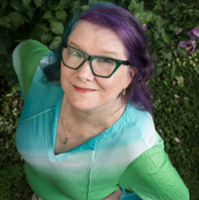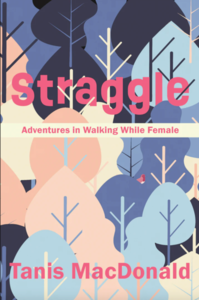"An Act of Freedom and a Precarious Practice" Tanis MacDonald on the Politics and Culture of Taking a Walk
Taking a walk is a deceptively simple thing. To walk around outside can do wonders for our mental and physical health, sense of community, and stress levels. And yet "taking a walk" also exists at a fascinating intersection of questions about safety, accessibility, class, race, gender, health, climate change, and our relationship to the animal world.
Enter essayist, poet, and professor Tanis MacDonald, who explores the many subtle aspects of what goes into a simple walk in Straggle: Adventures in Walking While Female (Wolsak & Wynn). In these essays, MacDonald takes readers along on walks around her home turf in Southern Ontario, as she entertains and provokes, weaving in everything from experiences of mysterious deer to discussions of who gets to feel safe and secure while out and about.
Sharp, funny, and timely, Straggle is a triumph both in its content and its innovative execution, which draws on MacDonald's poetic talents to weave a genre fluid result with emotional impact. She also ranges back through "walking memories", like helping her mother relearn steps after a painful fall and the magic of long walks in Winnipeg as a child. When walking can be a political act, MacDonald welcomes the reader by her side for the journey.
We're excited to speak with her today as part of our True Story nonfiction interview series. She tells us about walking as both freedom and risk, about her thoughts on nonfiction (no hyphen please!) and research, and the magic of "hearing" a book project click.
Open Book:
Tell us about your new book and how it came to be. What made you passionate about the subject matter you're exploring?
Tanis MacDonald:
My new book is called Straggle: Adventures in Walking While Female. It’s a mainly-prose book with lyric splashes: think of it as Gold Medal Ribbon ice cream in which the chocolate and vanilla are the prose and the caramel ribbon is poetry. Straggle came into being as part of a discussion of what it means to belong, or not belong, to a place, and then I expanded it to explore the cultural politics of walking. There are a lot of books written about walking, but I wanted to zero in on the paradox of walking as an act of freedom and walking as a precarious practice for women and other people whose safety is sometimes threatened.
OB:
What was your research process like for this book? Did you encounter anything unexpected while you were researching?
TM:
When writing a book that captures an experience, I think it’s vital to shape the material beyond the narrative. That’s where research comes in: as ballast, as a frame, or as a guide to thinking differently. For instance, I knew that I wanted to write an essay about the deer in the Laurel Creek Conservation Area, and I worried that I’d be hampered by how seldom I see them. But I discovered when I read Elizabeth Marshall Thomas’s research into the ways that deer – does in particular – can discern the vanishing point at which humans cannot see them. You know how you can blink and they’re gone? That was a good surprise to discover. It meant (among other things) that I wasn’t bad at seeing; the deer were experts at melting into thin air! In another example, my research into falling as a social phenomenon found a lot of performance artists who have worked on falling for years, and that is some fascinating stuff that I will probably keep digging into.
OB:
Do you have an opinion on how the word nonfiction is set – i.e. with or without a hyphen?
TM:
LOL! A little while ago, we had a huge debate in my department about this. We were choosing a name for a course, and many of us had strong feelings about that hyphen. We finally settled on nonfiction without a hyphen because it would fit better on a transcript – and because the use of the non-hyphenated nonfiction was becoming more popular. I was not an early adopter, but now I prefer it.
Your CanLit News
Subscribe to Open Book’s newsletter to get local book events, literary content, writing tips, and more in your inbox
OB:
A lot of nonfiction prizes and anthologies have expanded to welcome more personal nonfiction as well as strictly research-based nonfiction. What do you think of this shift within the genre?
TM:
I think that the personal seeps into writing which is research-based in all kinds of ways, some covert and subtle, and some quite blatant, so this shift acknowledges what has been true all along: that we research what intrigues us, and what intrigues us is personal, even when we are writing scholarly or research-based work. And to look at it another way, it’s good to research especially when the subject is “personal”; there’s always more dimensions to a story than the fact that it happened.
OB:
What do you do if you're feeling discouraged during the writing process? Do you have a method of coping with the difficult points in your projects?
TM:
There’s an important difference between feeling unsure and feeling overwhelmed/exhausted, and I went through both of these while writing this book. I was absolutely exhausted in the spring of 2020, and needed to recover thoroughly before taking up work on the book again. (There’s an essay about this in Straggle, so you can check out the longer version of what that meant for me.) But for feeling unsure, there is a great solution, and it’s called a writers’ group. I am lucky enough to have a group of writers who I trust to read early drafts and give smart commentary on how to develop those pieces. Of course, I do the same for them. Attention is generosity. Reciprocity is the key to getting stronger and more confident as a writer.
OB:
Do you remember the first moment you began to consider writing this book? Was there an inciting incident that kicked off the process for you?
TM:
This might sound a bit mystical but sometimes I can hear something click into place as I refine a story or essay. With that sound of something literally falling into place, I can start to see how that essay will become a piece in a mosaic of ideas, or more practically, could be part of a book. For Straggle, I was deep into writing about an open secret about how I walk (i.e. kinda geekily) and I started to weave together a lifetime of stories about walking the way I do. That essay, “Walk This Way,” became a form of truth-telling that is equal parts intimate and readily observable. That was the keystone piece in writing this book.
OB:
What defines a great work of nonfiction, in your opinion? Tell us about one or two books you consider to be truly great books.
TM:
I’m going to praise two books of essays: Cathy Park Hong’s Minor Feelings: An Asian American Reckoning and Helen Humphreys’s And A Dog Named Fig. Both of these books examine the meat and the minutiae of living in a vulnerable but determined body, and ways of making art and living a recognizable, messy, embodied life. Each essay is a polished stone: full of wit and wants and the best weirdness. The third is Say Nothing: A True Story of Murder and Memory in Northern Ireland by Patrick Radden Keefe. I am not much of a true crime reader, but Keefe’s research into one woman’s death in the midst of the Troubles spirals out into a historical and cultural examination of violence.
OB:
What are you working on now?
TM:
Currently, I am a few essays into writing a nonfiction book about working-class feminism and am listening for that click!
________________________________________________
Tanis MacDonald is an essayist, poet, professor, and free-range literary animal. She is the host of the podcast Watershed Writers, and the author of Out of Line: Daring to Be an Artist Outside the Big City. Her essay “Mondegreen Girls” won the Open Seasons Award for Creative Nonfiction in 2021. She identifies as a bad birder, and lives near Ose’kowáhne in southwestern Ontario as a grateful guest on traditional Haudenosaunee territory.






